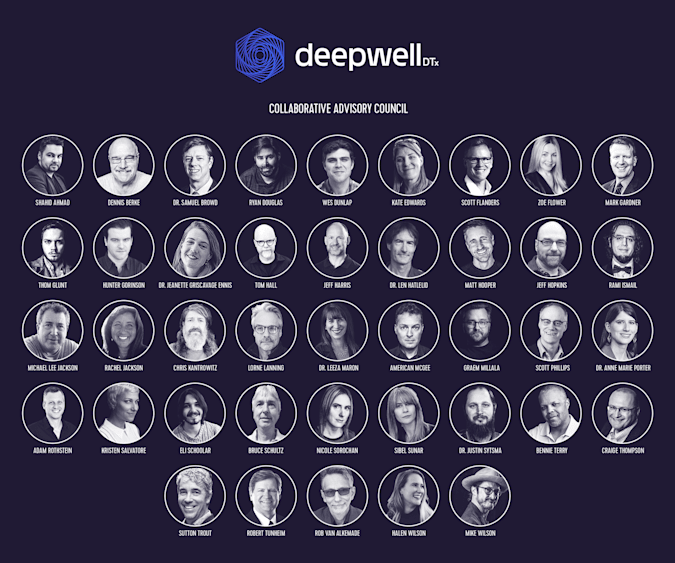Therapy has an engagement problem. Despite the benefits of treatment plans and at-home exercises, people generally resist anything that feels like work, and this impedes the mental-health recovery process across the board. Clinicians have attempted to bridge this gap with various devices and reward systems, but still, it’s often incredibly difficult to motivate patients to help themselves.
Video games have the opposite problem. Players can spend hours immersed in a single digital experience, seated in one spot and lost in their own world, but they’re often branded as “lazy” for this behavior. Video games are widely viewed as a waste of time, even with growing research demonstrating the psychological benefits of play.
So, why not smash these industries together and see what happens? DeepWell Digital Therapeutics is a new video game publisher and developer from Devolver Digital co-founder Mike Wilson and medical device creator Ryan Douglas, and their goal is to alter the way people think about games and mental health. The DeepWell DTx advisory council includes more than 40 medical researchers, doctors and veteran game developers, including Tom Hall (Doom), Zoe Flower (Hellbent Games), Rami Ismail (Nuclear Throne), Lorne Lanning (Oddworld) and American McGee (American McGee’s Alice).
“We fight with engagement all the time,” Douglas said. He worked for years with light therapy and other interventions designed to treat anxiety, depression and stress, but said accessibility and participation were constant battles. “And these [game developers] had cracked that code at a level that they were really hitting hard neurological reward centers in the brain, in a way that the availability to effectively change what people do and think in certain times of mental illness was vastly improved over anything I’d seen before .”
Deep Well DTx
DeepWell DTx isn’t about gamifying therapy tools or building digital experiences based on strict medical templates. Instead, the studio will analyze existing games for potential mental health benefits and, in some cases, work with interested developers to enhance these mechanics. The team will then secure approvals from regulators for these games to treat mental health issues including PTSD, anxiety, depression, OCD and addiction.
This is where Douglas’ expertise comes in. He’s the founder and former CEO of medical device company Nextern and he’s secured FDA approval for more than 25 medical devices over the past 15 years; he knows how to navigate this regulatory process and he sees games as a natural fit. He and Wilson started working on DeepWell about 18 months ago, in the middle of the COVID-19 pandemic.
“There’s a very specific regulatory pathway for this work,” Douglas said. “So, a couple key things — agencies have done a lot of work in the last couple years to figure out how software as a medical device and specifically digital therapeutics are going to work. The FDA has been collaborative in that work. And then in this emergency time, there has been more opportunity to do the work that we need to do to get these in people’s hands as quickly as possible. It’s arduous but not impossible.”
Additionally, DeepWell DTx will provide a framework for players to recognize these benefits as they play — whether that’s a label on the game’s storefront, a welcome screen or another digital signal — allowing them to adjust their mindset before pressing start.
“We’re super excited largely because of some intellectual property Ryan filed long before he met me, a couple years before he met me,” Wilson said. “We believe we’ve got a system built to enable game developers — eventually other media creators, as well — to work their magic and in a way that is already quite beneficial.”
It takes one whole minute before Wilson drops the phrase “digital psychedelics” into the conversation. This is kind of his thing; he’s an evangelist for psychedelics, with endless stories about Burning Man and the personal, therapeutic benefits he’s reaped from trips. Psychedelic therapy was a starting point for Wilson and Douglas, and they’re looking to mimic the perspective-shifting, calming effects of these substances through accessible digital experiences. They’re focused on alleviating a mental health crisis that was exacerbated by the global quarantine, using tools that people already have and naturally reach for.
“While it might not be as powerful as sitting with a macro dose of mushrooms and a couple of therapists, it might not be one session or two sessions or three, but it is an adjunct therapy that is good for you, that you might be way more likely to engage in and that the whole world has access to, even if they don’t have access to health care,” Wilson said. “These will be interventions that are helpful to people that are just paying regular game prices.”
Literally every game is up for review from the DeepWell DTx crew, from platformers and narrative adventures to RPGs and shooters, and interested developers can apply starting today. There’s also an in-house development arm of the DeepWell beast, and its first game is already halfway through development, with a few others in pre-production. The first DeepWell games are due to start rolling out in 2023.
All products recommended by Engadget are selected by our editorial team, independent of our parent company. Some of our stories include affiliate links. If you buy something through one of these links, we may earn an affiliate commission.
